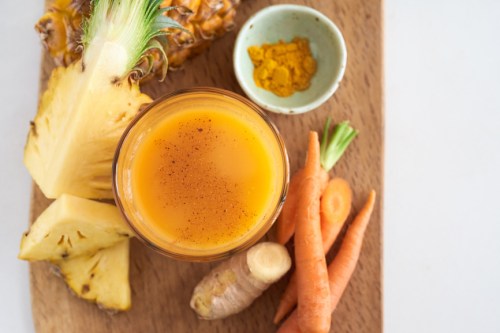Our editors independently select these products. Making a purchase through our links may earn Well+Good a commission
These days, it’s nearly impossible to escape the neverending chatter on social media related to gut health. And while we’re all about self-care, it can be challenging to discern what “healing” your gut even means when there’s little to no context or even questionable data before us.
Experts in This Article
gastroenterologist and co-author of The Microbiome Connection
That said, having a healthy gut is extremely important, as it can impact so many facets of overall well-being. The key to actually striking balance with your microbiome starts with this: ensuring the information you consume (literally) checks out. To that end, we spoke with Ali Rezaie, MD, a gastroenterologist and co-author of The Microbiome Connection, and the creator of Low Fermentation Eating—the inspiration for The Good LFE Cookbook—to set the record straight on what having a healthy gut really means and how to ensure the steps you take to get there are tailored to your body’s specific needs.
For starters, there isn’t just one way to define a healthy gut
First things first, Dr. Rezaie explains that defining a “healthy gut” isn’t as simple as you may think, because it’s simply not a one-size-fits-all definition. “We don’t know what a ‘normal’ microbiome looks like,” Dr. Rezaie says. “Your microbiome is unique to you, and there’s no known magic mix of bacteria.”
“We don’t know what a ‘normal’ microbiome looks like,” Dr. Rezaie says. “Your microbiome is unique to you, and there’s no known magic mix of bacteria.”
While there are classic patterns found in good gut health, each of us has a distinctly different microbiome. “The microbiome exists in different parts of the body, however the largest microbiome by far is in the gut. The gut microbiome can, in a way, be considered a completely separate organ in the body—it contains a vast ecosystem (aka, your gut flora) of over 1000 known species of bacteria, viruses, fungi, and protozoa, each with the potential to play a different role in your body,” says Dr. Rezaie.
According to him, external factors can also impact the makeup of the gut microbiome—so no two will ever be exactly alike. “Your diet, environment, medications, and genetics influence your microbiome; even your pets can affect your microbiome,” Dr. Rezaie says. Yet, that’s not to say that one type of microbiome composition is necessarily superior to another—like our DNA, they’re just different.
Since it’s nearly impossible to categorize gut health into one bucket, Dr. Rezaie stresses the importance of always fact-checking information on the topic, especially on social media. Then, only apply the findings on an as-needed basis, if credible, and tailor them to your specific needs. “Similar to other fields of medicine, it’s not easy to discern credible versus untrustworthy sources of information on social media. Look for information generated or written by academics and known experts in the field,” Dr. Rezaie says.
“Studying the microbiome is a young discipline, and it is not uncommon to encounter conflicting information on such topics. That is because our understanding about the microbiome is rapidly evolving,” Dr. Rezaie says.
That said, Dr. Rezaie acknowledges that even experts don’t know everything about the gut quite yet. “Studying the microbiome is a young discipline, and it is not uncommon to encounter conflicting information on such topics. That is because our understanding about the microbiome is rapidly evolving,” Dr. Rezaie says.
So… how can you tell if your gut even needs “healing” in the first place?
According to Dr. Rezaie, there are some science-backed steps you can take to help support a healthier microbiome—starting with consuming a wide variety of plant-based foods and nutrients. “Though each individual’s microbiome is unique and there’s really no ‘one-size-fits-all’ solution, if you are healthy, a well-balanced diet of carbohydrates, fat, and protein is recommended,” he says.
However, if your gut isn’t balanced, it can manifest in several uncomfortable side effects. “Microbiome imbalance can lead to various symptoms, including bloating, constipation, diarrhea, and alternating bowel habits,” Dr. Rezaie says.
An example of a microbiome imbalance is small intestinal bacterial overgrowth (SIBO), where excessive amounts of bacteria reside in the small bowel. “Fermentation of food by these bacteria can lead to excessive gas production and bloating,” Dr. Rezaie says. The solution? Resetting your gut bacteria with what you eat. “Microbes in the gut can change drastically based on what we eat; various foods can make the gut environment more or less favorable for bacteria,” Dr. Rezaie says. For SIBO patients, that means sticking to a low fermentation eating plan, like the recipes in The Good LFE Cookbook.
That further emphasizes the idea that all microbiome imbalances should not be treated with the same gut-healing solutions. On the contrary, gut remedies must be tailored to meet your specific needs. “Depending on the disease, a modified diet can be hugely impactful, but this really needs to be determined by your doctor,” Dr. Rezaie says.
TL; DR? The concept of “healing your gut” is yet another reminder to get the full, comprehensive scope of your gut health needs before incorporating what you come across on the internet into your daily routine.
A registered dietitian’s guide to gut health:
Sign Up for Our Daily Newsletter
Get all the latest in wellness, trends, food, fitness, beauty, and more delivered right to your inbox.
Got it, you've been added to our email list.










